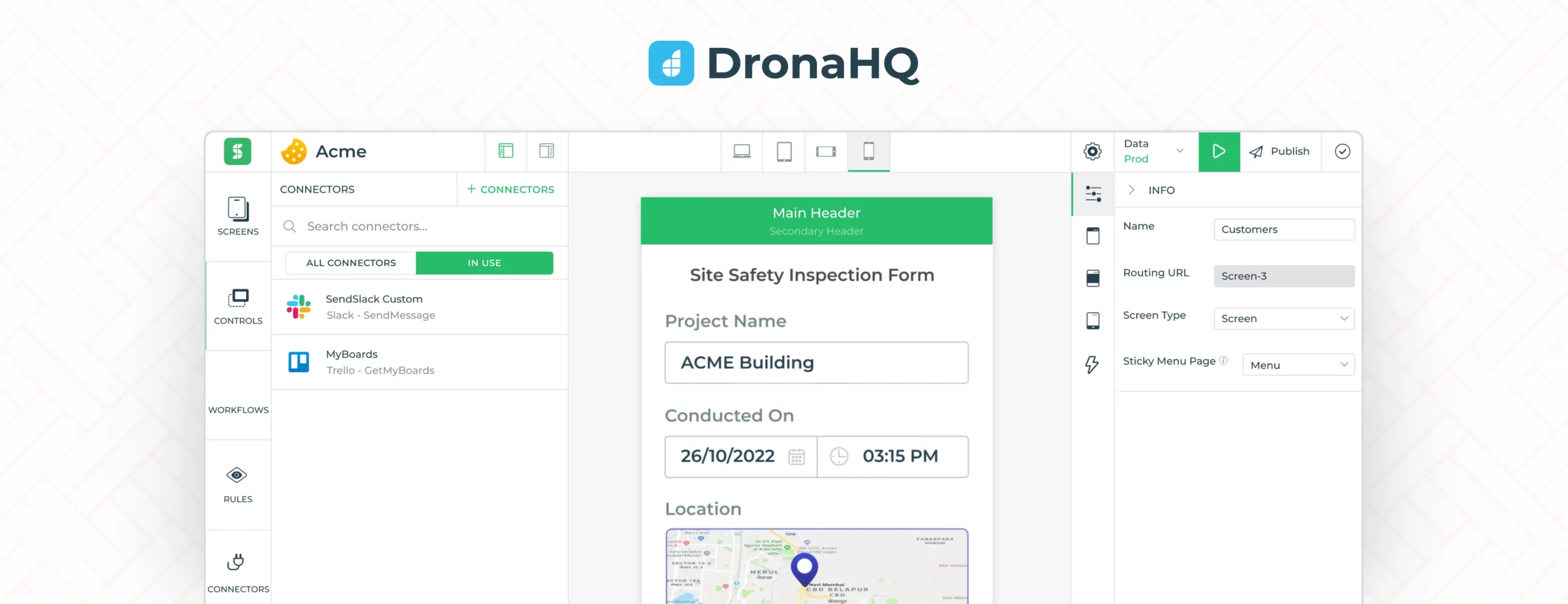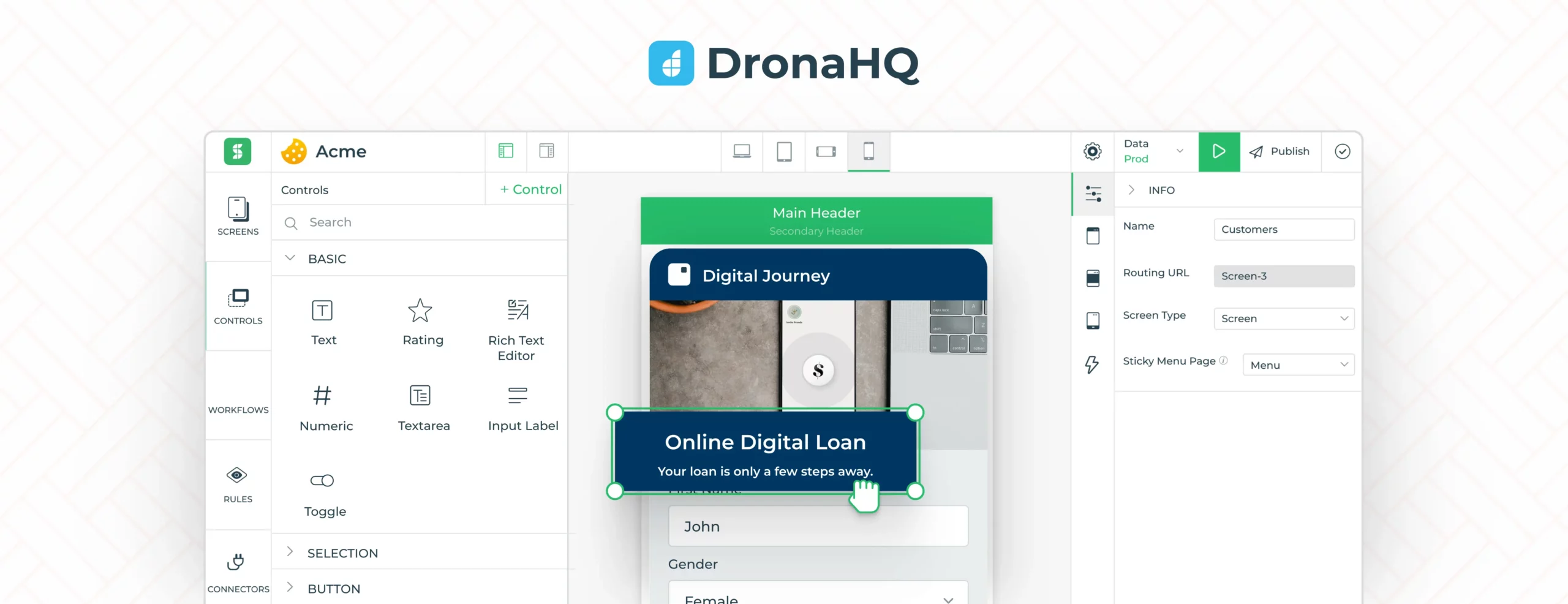

Custom mobile app development: An all-inclusive guide
Custom app development is one of the biggest investments your company is likely to make. The development cost keeps going up from hiring designers, back-end developers, and project managers. While investing in something huge, there are some distinct things to remember. Otherwise, you might end up with a fast solution that doesn’t satisfy anyone.
Stay with us as we discuss how you can go for a custom mobile app development that actually drives investment.
But first, let us get into the basics.
What is custom mobile app development?
Custom mobile app development goes beyond the generic notion of tailoring apps to fit business-specific needs. It encompasses a diverse range of possibilities and approaches. Custom builds come in various forms, addressing a wide spectrum of requirements, from research and development projects to straightforward solutions. Traditionally, these apps are constructed from the ground up, utilizing popular programming languages like JavaScript and Python, or frameworks such as NodeJS, Rails, or Angular. The primary focus is on fulfilling specific demands that off-the-shelf solutions often fail to meet.
Having said that, there is another modern approach to app building that focuses on expediting and democratizing the process of building custom applications. This end of the market, or the low-code segment, gives users a way to visually design apps using reusable ui components and roll out apps faster. The key idea here is to break down the application into more easily manageable and understandable pieces.
Low code tools are democratic and flexible. It focuses on lowering the barriers to entry for developers while enabling faster iterations and aiding experts to customize fully functional applications. Whereas traditional tools are aimed at only professionals with the core focus on speeding up specific kinds of build-tasks rather than being inclusive.
Benefits of custom mobile app development for businesses
Today businesses rely less on custom scripts as they no longer match the required speed and agility. Moreover, there are few developers who have experience in each tool involved in any given end-to-end process, making the process way more expensive. Here are some of the benefits of custom mobile app development –
Heightened security
Off-the-shelf solutions may sometimes lack specialized security features. This can pose a real threat to your data safety. In contrast, a customized app will allow you to implement specific security measures your business needs and eliminate possible threats and dangers via data encryption. Additionally, most custom apps meet the requirements of various OSs and APIs.
Scalable
Generalized apps may fail to handle bigger data loads as your business grows. These apps are usually built to process a limited number of resources. This problem is not evident when you go for custom mobile app development. They are built with all necessary growth parameters in mind so they can easily scale if any need arises.
Easy to maintain
When you use off-the-shelf apps, you are dependent on their development team for any updates and maintenance. At worst, if they suspend development, you will be stranded midway without any progress. With custom mobile apps, you will get full control over the development and maintenance process without depending on any third party.
Why consider low code to develop custom mobile apps?
The popularity of low code has exploded in the last few years. So much so that 60% of apps are built outside IT, according to TechRepublic. Here are some reasons why low code will be the perfect choice for developing custom apps.
Visual builder
As you can deduce from the term, visual builders let you create and deploy mobile apps with drag-and-drop functionality. Low code is popular for offering an intuitive visual UI enabling developers to build all types of apps. It offers a model-driven approach to help you visualize how the app works as it is being built with the ability to launch with a one-click deployment.
Speed
According to research by Forrester, 50% of organizations say that they use the low code approach because it has the fastest speed of delivery as compared to other methodologies. The majority of respondents from a global survey indicated that low-code development is on average 40%-60% faster than traditional development. Low-code apps are built from ready-made blocks, making the debugging and testing process much faster since there is no need for unit testing.
Customization
As we have spoken before, low-code platforms use a visual approach to custom development with reusable components, communication tools, and other features to guide you through every step of the application lifecycle. While you can easily assemble apps with drag and drop, low code also gives you the freedom to code. For example, you can add custom scripts to write various functions, including a support chatbot, in your Insurance helpdesk.
Accelerated Time to Market
Time to market, a crucial metric in product development, is a top priority for technology leaders, and low code development empowers you to achieve it efficiently. In the traditional approach, projects can take several months to even a year, depending on business requirements.
On the other hand, low code development is highly inclusive, enabling active participation from business users across departments in the app development and design process. By adopting the low code approach, you can significantly reduce the time to market, with the entire journey from conception to deployment spanning from just a few months to a few weeks.
Low code leverages a library of reusable components, allowing users to take advantage of pre-built UI components and seamlessly merge them to create comprehensive applications. Since these components are already tested for performance, bugs, and security, it eliminates the need for extensive testing, saving valuable time for the QA team.
Furthermore, low code platforms offer exceptional speed and flexibility, enabling the graphical creation of prototypes. This approach significantly reduces the time between iterations, enabling rapid app development and deployment. By leveraging the power of low code, you can quickly roll out multiple apps, expediting the time to market and gaining a competitive edge in the market.
Easy integration capabilities
Data is the foundation of every application and plays a huge role in determining whether projects succeed or fail. Due to immense scaling requirements, data integration has become increasingly complex in companies.
Low code lowers the barrier to entry for people who want to connect data endpoints while enabling users to reduce maintenance efforts through harmonization and standardization of APIs. Low-code platforms allow you to securely integrate data and logic from any source, system, or service, including core legacy systems.
Low code mobile app: use cases
From automating manual processes to extending the power of legacy systems, organizations across every industry are using low code to build value-driven business solutions, especially mobile applications. Here are some popular use cases-
Fintech apps
Fintech apps have a wide spectrum of forms and can vary from project to project. They are most popular for KYC verification, loan approvals, license management, fraud monitoring, and more.
Low code enables-
1. Fintech organizations adopt a self-service approach to data analytics and visualization.
2. Delivers good governance around configurations, allows admins to control access level across database, APIs, apps, and screens, and controls applications’ deployment from one environment to another.
3. Speedy upgrades and bug fixes.
Order management
With low code, building a modern order management system that is not restrained by legacy or rigid off-the-shelf solutions is easy. You can easily connect with popular databases like MongoDB, MySQL, or PostgreSQL to check items, update information, or delete redundant information. You can also add a notification task to the workflow to initiate or trigger alerts and email notifications.
Task management
Seamlessly integrate the visual workflow management system or the Kanban board UI control offered by low code platforms like DronaHQ to keep track of tasks as they move through a process. Kanban boards optimize task delivery across multiple teams and handle even the most complex projects in a single environment. It is flexible and implemented in any industry and various settings like supermarkets, motor assembling lines, and software development companies.
Portals
A custom portal offers a personalized experience to meet the customers’ ever-evolving needs. These portals are cost-effective digital tools that deliver self-service experiences, such as submitting claims, paying bills, and generating quotes. Low code platforms like DronaHQ let you embed your apps as features, sections, or widgets inside your internal or external facing portals.
Choose DronaHQ for building custom mobile apps at blazing speed
DronaHQ is a low-code development platform that lets companies build highly scalable and secure mobile apps conveniently and quickly.
Here’s what makes DronaHQ a leading low-code platform for building your custom mobile application:
Hyper personalization
Build your app as you visualize it. DronaHQ offers various in-built, ready-to-implement capabilities, such as custom branding and white labeling.
Universal access
Build apps once and run them across iOS, Android, and Web platforms.
An exclusive drag-and-drop builder
DronaHQ hosts over 150 in-built and advanced controls like charts, form controls, dashboards, etc, in addition to advanced building capabilities like Actionflows that let users configure actions/logic on front-end events such as button click, row click, page open, and so on.
High flexibility
Add JavaScript in most places to customize tools the way you want. Import JS libraries, transform API responses, and design custom UI components.
Enterprise-grade security
The platform is SOC-II and ISO 27001 certified. Only authorized users are allowed access with additional security measures – SSO configuration, and granular permissions, to name a few.
Integrations
DronaHQ lets you connect to multiple data sources, third-party apps, and custom APIs as and when a demand arises. The platform can integrate your custom portal to any number of native integrations and connects your data sources seamlessly.
Easy hosting
Not just development, you can host your freshly built portal with minimal configurations using its cloud hosting options. You can also use your server and self-host.
Custom mobile app development is a significant investment for any business, but it doesn’t have to be daunting or costly. By choosing the right solution, businesses can unlock the true potential of custom app development and drive substantial returns on investment. Whether through traditional development or the modern low-code approach, businesses can tailor apps to their specific needs, ensuring enhanced security, scalability, and ease of maintenance. Low code offers visual builders, faster time to market, customization options, easy integration capabilities, and a wide range of use cases across industries. Platforms like DronaHQ provide the tools and features necessary to build custom mobile apps at blazing speed while ensuring hyper-personalization, universal access, flexibility, enterprise-grade security, and seamless integrations. With the right low-code development platform, businesses can accelerate their digital transformation and achieve success in the mobile app landscape.
Get started today and unlock the power of custom mobile app development with DronaHQ!











